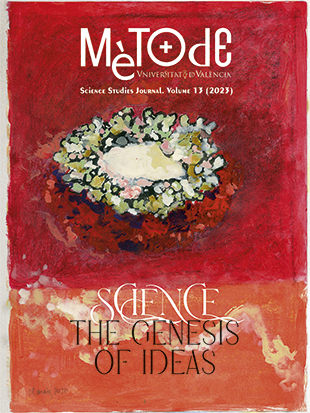Ciència i política contra la desertificació: La resposta de les institucions davant un repte global
DOI:
https://doi.org/10.7203/metode.13.21901Paraules clau:
CNULD, zones àrides, degradació de terres, sequera, interfície ciència-política Resum
Resum
La desertificació és un concepte controvertit del qual encara es discuteix la naturalesa, extensió, causes i possibles solucions. En aquest article es revisen els arguments esgrimits per situar la desertificació com un gran repte ambiental global i es descriu la resposta institucional dins del sistema de les Nacions Unides, especialment la que representa la Convenció de Nacions Unides de Lluita contra la Desertificació (CNULD). Els elements més significatius del debat sobre la desertificació són analitzats atenent les seues dimensions científiques i polítiques. Es conclou en la necessitat d’establir un marc integrat d’avaluació i resposta davant la desertificació validat per una interfície entre ciència i política.
 Descàrregues
Descàrregues
 Referències
Referències
Akhtar-Schuster M., Amiraslani, F., Diaz Morejon, C. F., Escadafal, R., Fulajtar, E., Grainger, A., Kellner, K., Khan, S. I., Perez Pardo, O., Sauchanka, U., Stringer, L. C., Reda, F., & Thomas, R. J. (2016). Designing a new science-policy communication mechanism for the UN Convention to Combat Desertification. Environmental Science & Policy, 63, 122–131. https://doi.org/10.1016/j.envsci.2016.03.009
Carr, S., & Mpande, R. (1996). Does the definition the issue matter? NGO influence and the international Convention to Combat Desertification in Africa. The Journal of Commonwealth and Comparative Politics, 34(1), 143–166. https://doi.org/10.1080/14662049608447720
Corell, E. (1999). The negotiable desert: Expert knowledge in the negotiations of the convention to combat desertification. Linkoping Studies in Arts and Science No. 191. Linkoping University.
King, C., & Thomas, D. S. G. (2014). Monitoring environmental change and degradation in the irrigated oases of the Northern Sahara. Journal of Arid Environments, 103, 36–45. https://doi.org/10.1016/J.JARIDENV.2013.12.009
Martinez-Valderrama, J., Guirado, E., & Maestre, F. T. (2020). Desertifying deserts. Nature Sustainability, 3, 572–575. https://doi.org/10.1038/s41893-020-0561-2
Martinez-Valderrama, J., Sanjuan, M. E., del Barrio, G., Guirado, E., Ruiz, A., & Maestre, F. T. (2021). Mediterranean landscape re-greening at the expense of South American agricultural expansion. Land, 10(2), 204. https://doi.org/10.3390/land10020204
Mirzabaev, A., Wu, J., Evans, J., Garcia-Oliva, F., Hussein, I. A. G., Iqbal, M. H., Kimutai, J., Knowles, T., Meza, F., Nedjraoui, D., Tena, F., Turkeş, M., Vazquez, R. J., & Weltz, M. (2019). Desertification. In P. R. Shukla, J. Skea, E. Calvo Buendia, V. Masson-Delmotte, H.-O. Portner, D. C. Roberts, P. Zhai, R. Slade, S. Connors, R. van Diemen, M. Ferrat, E. Haughey, S. Luz, S. Neogi, M. Pathak, J. Petzold, J. Portugal Pereira, P. Vyas, E. Huntley, … J. Malley (Eds.). Climate change and land: An IPCC special report on climate change, desertification, land degradation, sustainable land management, food security, and greenhouse gas fluxes in terrestrial ecosystems. IPCC.
Mortimore, M. (2016). Changing paradigms for people-centred development in the Sahel. In R. Behnke & M. Mortimore (Eds.), The end of desertification? (pp. 65–98). Springer. https://doi.org/10.1007/978-3-642-16014-1
Mortimore, M., Anderson, S., Cotula, L., Davies, J., Faccer, K., Hesse, C., Morton, J., Nyangena, W., Skinner, J., & Wolfangel, C. (2009). Dryland opportunities: A new paradigm for people, ecosystems and development. IUCN, IIED, & UNDP/DDC.
Porter, G., & Brown, J. W. (1991). Global environmental politics. Westview Press.
Safriel, U. (2009). Deserts and desertification challenges but also opportunities. Land Degradation and Development, 20, 353–366.
Stafford-Smith, D. M. (2016). Desertification: Reflections on the mirage. In R. Behnke & M. Mortimore (Eds.). The end of desertification? (pp. 539–560). Springer. https://doi.org/10.1007/978-3-642-16014-1
Stafford-Smith, D. M., & Reynolds, J. F. (2002). The Dahlem desertification paradigm: A new approach to an old problem. In J. F. Reynolds & D. M. Stafford-Smith (Eds.), Global desertification. Do humans cause deserts? (pp. 403–424). Dahlem University Press.
Stringer, L. (2008). Can the UN Convention to Combat Desertification guide sustainable use of the world’s soils? Frontiers in Ecology and the Environment, 6(3), 138–144. https://doi.org/10.1890/070060
Thomas, R. J., Akhtar-Schuster, M., Stringer, L. C., Marques, M. J., Escadafal, R., Abraham, E., & Enne, G. (2012). Fertile ground? Options for a science-policy platform for land. Environmental Science & Policy, 16, 122–135. https://doi.org/10.1016/j.envsci.2011.11.002
Thomas, D. S. G., & Middleton, N. (1994). Desertification: Exploding the myth. John Wiley & Sons.
Tiffen, M., Mortimore, M., & Gichuki, F. (1994). More people less erosion: Environmental recovery in Kenya. John Wiley.
Toulmin, C. (2001). Lessons from the theatre: Should this be the final curtain call for the Convention to Combat Desertification? WSSD Opinion Series. International Institute for Environment and Development.
Toulmin, C., & Brock, K. (2016). Desertification in the Sahel: Local practices meets global narrative. In R. Behnke & M. Mortimore (Eds.), The end of desertification? (pp. 37–64). Springer. https://doi.org/10.1007/978-3-642-16014-1
UNCCD. (1994). The United Nations Convention to Combat Desertification in those countries experiencing serious droughts and/or desertification, particularly in Africa. Secretariat of the United Nations Convention to Combat Desertification.
Verstraete, M. M. (1986). Defining desertification: A review. Climate Change, 9, 5–18. https://doi.org/10.1007/BF00140520
Vogel, C., H., & Smith, J. (2002). Building social resilience in arid ecosystems. In J. F. Reynolds & D. M. Stafford-Smith (Eds.), Global desertification. Do humans cause deserts? (pp. 149–166). Dahlem University Press.
Descàrregues
Publicades
Com citar
-
Resum1655
-
PDF 690
Número
Secció
Llicència
![]()
Tots els documents inclosos en OJS són d'accés lliure i propietat dels seus autors.
Els autors que publiquen en aquesta revista estan d'acord amb els següents termes:
- Els autors conserven els drets d'autor i garanteixen a la revista el dret a la primera publicació del treball, llicenciat baix una llicència de Reconeixement-NoComercial-SenseObraDerivada 4.0 Internacional de Creative Commons, que permet a altres compartir el treball amb un reconeixement de l'autoria del treball i citant la publicació inicial en aquesta revista.
- Es permet i s'anima els autors a difondre la versió definitiva dels seus treballs electrònicament a través de pàgines personals i institucionals (repositoris institucionals, pàgines web personals o perfils a xarxes professionals o acadèmiques) una vegada publicat el treball.





